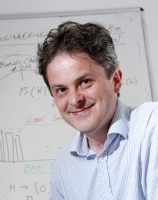ILP 2015 PROGRAMME
Thursday, August 20
| 9:05 | Registration | |
| 9:40 |
Opening Conference co-Chairs: Katsumi Inoue, Hayato Ohwada, Akihiro Yamamoto |
|
| 9:50 |
Invited Talk 1 (Chair: Hayato Ohwada) Stephen Muggleton: Meta-Interpretive Learning: achievements and challenges |
slides |
| 10:50 | Coffee & Poster | |
| 11:20 | Session 1: Nonmonotonic Semantics (Chair: Chiaki Sakama) | |
| 11:20 |
Golnoosh Farnadi, Stephen H. Bach, Marjon Blondeel, Marie-Francine Moens, Martine De Cock and Lise Getoor: Statistical Relational Learning with Soft Quantifiers (L) |
paper slides |
| 11:50 |
Ondřej Kuželka, Jesse Davis and Steven Schockaert: Constructing Markov Logic Networks from First-Order Default Rules (L) |
paper slides |
| 12:20 |
Jianmin Ji: Brave Induction Revisited (LS) |
paper slides |
| 12:40 | Welcome lunch at Nishio Yatsuhashi no Sato | |
| 13:50 | Session 2: Logic and Learning (Chair: Akihiro Yamamoto) | |
| 13:50 |
Tuan Dung Ho, Min Zhang and Kazuhiro Ogata: A Case Study on Extracting the Characteristics of the Reachable States of a State Machine formalizing a Communication Protocol with Inductive Logic Programing (LS) |
paper slides |
| 14:10 |
Colin Farquhar, Gudmund Grov, Andrew Cropper, Stephen Muggleton and Alan Bundy: Typed meta-interpretive learning for proof strategies (S) |
paper slides |
| 14:25 |
Chiaki Sakama, Tony Ribeiro and Katsumi Inoue: Learning Deduction Rules by Induction (S) |
paper slides |
| 14:40 | Session 3: Complexity (Chair: Akihiro Yamamoto) | |
| 14:40 |
Ondřej Kuželka and Jan Ramon: Mine ’Em All: A Note on Mining All Graphs (S) |
paper slides |
| 14:55 |
Ondřej Kuželka and Jan Ramon: A Note on Restricted Forms of LGG (S) |
paper slides |
| 15:10 | Coffee & Poster | |
| 15:40 | Session 4: Action Learning (Chair: Stephen Muggleton) | |
| 15:40 |
Christophe Rodrigues, Henry Soldano, Gauvain Bourgne and Céline Rouveirol: Collaborative decision in multi agent learning of action models (LS) |
paper slides |
| 16:00 |
Claude Sammut, Raymond Sheh, Adam Haber and Handy Wicaksono: The Robot Engineer (S) |
paper slides |
| 16:15 |
Andrew Cropper and Stephen Muggleton: Learning Efficient Logical Robot Strategies Involving Composable Objects (P) |
paper slides |
| 16:30 |
Tony Ribeiro, Morgan Magnin, Katsumi Inoue and Chiaki Sakama: Learning Multi-Valued Biological Models with Delayed Influence from Time-Series Observations (S) |
paper slides |
| 16:45 | Session 5: Biological Modeling (Chair: Fabrizio Riguzzi) | |
| 16:45 |
Samuel Neaves and Sophia Tsoka: Using ILP to Identify Pathway Activation Patterns in Systems Biology (S) |
paper slides |
| 17:00 |
Adrien Rougny, Yoshitaka Yamamoto, Hidetomo Nabeshima, Gauvain Bourgne, Anne Poupon, Katsumi Inoue and Christine Froidevaux: Completing signaling networks by abductive reasoning with perturbation experiments (S) |
paper slides |
| 17:15 |
Tadasuke Ito, Shotaro Togami, Shin Aoki and Hayato Ohwada: In Silico Screening of Zinc(II) Enzyme Inhibitors by ILP (S) |
paper slides |
| 17:30 |
Atsushi Matsumoto, Katsutoshi Kanamori, Kazuyuki Kuchitsu and Hayato Ohwada: Extracting the Common Structure of Compounds to Induce Plant Immunity Activation using ILP (S) |
paper slides |
| 17:45 |
Ashwin Srinivasan, Michael Bain, Deepika Vatsa and Sumeet Agarwal: Identification of Transition Models of Biological Systems in the Presence of Transition Noise (S) |
paper slides |
| 18:00 | Conference Reception at Rakuyuu Kaikan |
Friday, August 21
| 9:00 | Registration | |
| 9:30 |
Invited Talk 2 (Chair: Katsumi Inoue) Taisuke Sato: Distribution semantics and cyclic relational modeling |
slides |
| 10:30 | Coffee & Poster | |
| 11:00 | Session 6: Distribution Semantics (Chair: Luc De Raedt) | |
| 11:00 |
Fabrizio Riguzzi, Elena Bellodi, Riccardo Zese, Giuseppe Cota, and Evelina Lamma: Structure Learning of Probabilistic Logic Programs by MapReduce (LS) |
paper slides |
| 11:20 |
Giuseppe Cota, Riccardo Zese, Elena Bellodi, Fabrizio Riguzzi and Evelina Lamma: Distributed Parameter Learning for Probabilistic Ontologies (LS) |
paper slides |
| 11:40 |
Fabrizio Riguzzi, Elena Bellodi, Riccardo Zese, Giuseppe Cota, and Evelina Lamma: Probabilistic Inductive Constraint Logic (LS) |
paper slides |
| 12:00 | Session 7: Implementation (Chair: Luc De Raedt) | |
| 12:00 |
Carlos Alberto Martínez-Angeles, Inês Dutra, Vítor Santos Costa and Jorge Buenabad-Chávez: Processing Markov Logic Networks with GPUs (S) |
paper slides |
| 12:15 |
Noriaki Chikara, Miyuki Koshimura, Hiroshi Fujita and Ryuzo Hasegawa: Inductive Logic Programming Using a MaxSAT Solver (S) |
paper slides |
| 12:30 |
Hiroyuki Nishiyama and Hayato Ohwada: Yet Another Parallel Hypothesis Search for ILP (S) |
paper slides |
| 12:45 | Lunch | |
| 13:45 | Session 8: Kernel Programming (Chair: Filip Zelezny) | |
| 13:45 |
Laura Antanas, Plinio Moreno and Luc De Raedt: Relational Kernel-based Robot Grasping with Numerical Features (L) |
paper slides |
| 14:15 |
Francesco Orsini, Paolo Frasconi and Luc De Raedt: kProlog: an algebraic Prolog for kernel programming (L) |
paper slides |
| 14:45 |
Nirattaya Khamsemanan, Cholwich Nattee and Masayuki Numao: Distance based Kernels for First-Order Logic Data (S) |
paper slides |
| 15:00 |
Excursion: Guided Bus Tour Sanjusangendo Fushimi Inari Shrine |
|
| 18:30 |
Conference Banquet at Rokusei Guest Speeches by Koichi Furukawa and Fumio Mizoguchi ILP Banquet Speech by Stephen Muggleton |
Saturday, August 22
| 9:00 | Registration | |
| 9:30 |
Invited Talk 3 (Chair: Gerson Zaverucha) Luc De Raedt: Applications of Probabilistic Logic Programming |
slides |
| 10:30 | Coffee & Poster | |
| 11:00 | Session 9: Data and Knowledge Modeling (Chair: Nobuhiro Inuzuka) | |
| 11:00 |
Sergey Paramonov, Matthijs van Leeuwen, Marc Denecker and Luc De Raedt: An exercise in declarative modeling for relational query mining (L) |
paper slides |
| 11:30 |
Clément Charnay, Nicolas Lachiche and Agnès Braud: CARAF: Complex Aggregates within Random Forests (LS) |
paper slides |
| 11:50 |
Szymon Klarman and Katarina Britz: Ontology Learning from Interpretations in Lightweight Description Logics (LS) |
paper slides |
| 12:10 |
Andrew Cropper, Alireza Tamaddoni-Nezhad and Stephen Muggleton: Meta-Interpretive Learning of Data Transformation Programs (S) |
paper slides |
| 12:25 | Lunch | |
| 13:25 | Session 10: Cognitive Modeling (Chair: Hayato Ohwada) | |
| 13:25 |
Wang-Zhou Dai, Stephen Muggleton and Zhi-Hua Zhou: Logical Vision: Meta-Interpretive Learning for Simple Geometrical Concepts (S) |
paper slides |
| 13:40 |
Fumio Mizoguchi, Hayato Ohwada, Hiroyuki Nishiyama, Akira Yoshizawa and Hirotoshi Iwasaki: Identifying Driver's Cognitive Distraction Using Inductive Logic Programming (S) |
paper slides |
| 13:55 |
Koichi Furukawa, Keita Kinjo, Tomonobu Ozaki and Makoto Haraguchi: On Skill Acquisition Support by Analogical Rule Abduction (P) |
paper slides |
| 14:10 |
Panel: ILP 25 Years (Coordinator: Stephen Muggleton) Panelists: Stephen Muggleton, Fabrizio Riguzzi, Filip Zelezny, Gerson Zaverucha, (Jesse Davis), Katsumi Inoue, Taisuke Sato |
slides |
| 15:10 | Coffee (no poster) | |
| 15:30 | Business Meeting | |
| 16:30 | Closing |
(L): long presentations (30 min: 20m talk + 10m QA)
(LS): long papers with short presentation (20 min: 15m talk + 5m QA)
(S): short papers (15 min: 10m talk + 5m QA)
(P): published/accepted papers (15 min: 10m talk + 5m QA)
INVITED SPEAKERS
Stephen Muggleton
Professor, Department of Computing, Imperial College London
Meta-Interpretive Learning: achievements and challenges

|
Meta-Interpretive Learning (MIL) is a recent Inductive Logic Programming technique aimed at supporting learning of recursive definitions. A powerful and novel aspect of MIL is that when learning a predicate definition it automatically introduces sub-definitions, allowing decomposition into a hierarchy of reuseable parts. MIL is based on an adapted version of a Prolog meta-interpreter. Normally such a meta-interpreter derives a proof by repeatedly fetching first-order Prolog clauses whose heads unify with a given goal. By contrast, a meta-interpretive learner additionally fetches higher-order meta-rules whose heads unify with the goal, and saves the resulting meta-substitutions to form a program. This talk will overview theoretical and implementational advances in this new area including the ability to learn Turing computabale functions within a constrained subset of logic programs, the use of probabilistic representations within Bayesian meta-interpretive and techniques for minimising the number of meta-rules employed. The talk will also summarise applications of MIL including the learning of regular and context-free grammars, learning from visual representions with repeated patterns, learning string transformations for spreadsheet applications, learning and optimising recursive robot strategies and learning tactics for proving correctness of programs. The talk will conclude by pointing to the many challenges which remain to be addressed within this new area. |
Taisuke Sato
Professor Emeritus, Tokyo Institute of Technology
Distribution semantics and cyclic relational modeling

|
It has been twenty years since the distribution semantics was proposed for probabilistic logic programming (PLP). Since then a plethora of PLP languages with the distribution semantics were developed including PRISM,ICL,LPADs,ProbLog,P-log,CP-logic and PITA to name a few. In this talk I first review Fenstat's representation theorem which mathematically relates probability to first-order logic. One of its consequences is that if one wishes to consistently assign probabilities to first-order formulas, the assignment should be based on "the possible worlds with a probability distribution." There is more than one way of defining such worlds however. The distribution semantics is one way of doing it. The semantics starts with a simple computable distribution and transforms it to a complex one with the help of the least model semantics in logic programming. I then overview a brief history of PRISM, the first implementation of the distribution semantics with the ability of parameter learning for probabilistic modeling. It is a probabilistic Prolog enhanced with a rich array of built-in predicates for probability computation, parameter learning, Bayesian inference and so on. The true power of PLP languages such as PRISM comes out when they deal with recursively defined infinite models. Consider Markov chains that contain infinitely many transitions or probabilistic context free grammars (PCFGs) that contain infinitely many sentence derivations. These models sometimes require to compute an infinite sum of probabilities. The latest development of PRISM enables us to compute this infinite sum of probabilities using cyclic propositional formulas and also makes the EM algorithm available implemented on top of this computation mechanism. I show an example of such infinite computation in cyclic relational modeling applied to plan recognition from partial observations. |
Luc De Raedt
Professor, Katholieke Universiteit Leuven
Applications of Probabilistic Logic Programming

|
Probabilistic logic programs combine the power of a programming language with a possible world semantics; they are typically based on Sato's distribution semantics [8] and they have been studied for over twenty years now. In this talk, I shall report on recent progress in applying this paradigm to challenging applications.
The first application domain will be that of robotics, where we have developed extensions of the basic distribution semantics to cope with dynamics as well continuous distributions [2]. The resulting representations are now being used to learn multi-relational object affordances, which specify the conditions under which actions can be applied on particular objects [3,4].
The second application is in a biological domain, where a decision theoretic extension of the distribution semantics [1] is the underlying inference engine of the PheNetic system [5,6], which extracts from an interactome, the sub-network that best explains genes prioritized through a molecular profiling experiment.
Finally, I shall report on our results in applying ProbFOIL [7] to the problem of machine reading in CMU's Never Ending Language Learning system. ProbFOIL is an extension of the traditional rule-learning system FOIL for use with the distribution semantics. |
CELEBRATING 20 YEARS OF DISTRIBUTION SEMANTICS
The distribution semantics for probabilistic logic programming was firstly published by Prof. Taisuke Sato at ICLP 1995 held in Japan.
The year 2015 marks the 20th anniversary of that publication.
The semantics was firstly proposed for probabilistic abduction,
but has much more influenced to the field of probabilistic ILP and then a fertile ground for the general AI based on the combination of symbolic and
statistical reasoning.
To celebrate the 20th anniversary of the distribution semantics,
there will be a special session at ILP 2015, which is dedicated to probabilistic ILP.
The session will start by the monumental talk by Taisuke Sato, who will give the background of the distribution semantics,
its impact to ILP, his current project and the future perspective. Other contributions will be selected from the accepted papers.
The abstract of Taisuke Sato's talk is given here.
This special session is partly sponsored by The Japanese Society for Artificial Intelligence.
PANEL: ILP 25 YEARS
Panelists: Stephen Muggleton, Fabrizio Riguzzi,
Filip Zelezny, Gerson Zaverucha,
Jesse Davis, Katsumi Inoue,
Taisuke Sato
To celebrate the silver jubilee of ILP conference series, ILP 2015 will organize a panel discussion to review the progress of ILP.
The discussion at the panel of ILP 2010 has been summarized as the survey paper
ILP turns 20: Biography and future challenges.
Several future perspectives were shown in that paper, but now the areas related to Machine Learning and Artificial Intelligence are rapidly changing.
Recent trends include learning from big data, from statistical learning to deep learning, integration of neural and symbolic learning, general intelligence, etc.
The panel will consider what ILP can contribute to these changes.
The panelists of "ILP 25 Year" consist of those chairs of the last five years of ILP conferences (2011 - 2015) and Taisuke Sato.
Each panelist will give his own view of recent trends of ILP for these five years, their positions in the 25 years history of ILP conferences,
and a perspective on "What next for ILP?" in particular. Each presentation will be followed by response to questions from the audience.
ACCEPTED PAPERS
Long papers:
Golnoosh Farnadi, Stephen H. Bach, Marjon Blondeel, Marie-Francine Moens, Martine De Cock and Lise Getoor.
Statistical Relational Learning with Soft Quantifiers
Ondřej Kuželka, Jesse Davis and Steven Schockaert.
Constructing Markov Logic Networks from First-Order Default Rules
Laura Antanas, Plinio Moreno and Luc De Raedt.
Relational Kernel-based Robot Grasping with Numerical Features
Francesco Orsini, Paolo Frasconi and Luc De Raedt.
kProlog: an algebraic Prolog for kernel programming
Sergey Paramonov, Matthijs van Leeuwen, Marc Denecker and Luc De Raedt.
An exercise in declarative modeling for relational query mining
Fabrizio Riguzzi, Elena Bellodi, Evelina Lamma, Riccardo Zese and Giuseppe Cota.
Structure Learning of Probabilistic Logic Programs by MapReduce
Szymon Klarman and Katarina Britz.
Ontology Learning from Interpretations in Lightweight Description Logics
Giuseppe Cota, Riccardo Zese, Elena Bellodi, Evelina Lamma and Fabrizio Riguzzi.
Distributed Parameter Learning for Probabilistic Ontologies
Jianmin Ji.
Brave Induction Revisited
Clément Charnay, Nicolas Lachiche and Agnès Braud.
CARAF: Complex Aggregates within Random Forests
Christophe Rodrigues, Henry Soldano, Gauvain Bourgne and Céline Rouveirol.
Collaborative decision in multi agent learning of action models
Tuan Dung Ho, Min Zhang and Kazuhiro Ogata.
A Case Study on Extracting the Characteristics of the Reachable States of a State Machine formalizing a Communication Protocol with Inductive Logic Programing
Fabrizio Riguzzi, Elena Bellodi, Evelina Lamma, Riccardo Zese and Giuseppe Cota.
Probabilistic Inductive Constraint Logic
SHORT PAPERS (WORK IN PROGRESS):
Claude Sammut, Raymond Sheh, Adam Haber and Handy Wicaksono.The Robot Engineer
Wang-Zhou Dai, Stephen Muggleton and Zhi-Hua Zhou.
Logical Vision: Meta-Interpretive Learning for Simple Geometrical Concepts
Chiaki Sakama, Tony Ribeiro and Katsumi Inoue.
Learning Deduction Rules by Induction
Samuel Neaves and Sophia Tsoka.
Using ILP to Identify Pathway Activation Patterns in Systems Biology
Carlos Alberto Martínez-Angeles, Inês Dutra, Vítor Santos Costa and Jorge Buenabad-Chávez.
Processing Markov Logic Networks with GPUs
Colin Farquhar, Gudmund Grov, Andrew Cropper, Stephen Muggleton and Alan Bundy.
Typed meta-interpretive learning for proof strategies
Andrew Cropper, Alireza Tamaddoni-Nezhad and Stephen Muggleton.
Meta-Interpretive Learning of Data Transformation Programs
Nirattaya Khamsemanan, Cholwich Nattee and Masayuki Numao.
Distance based Kernels for First-Order Logic Data
Noriaki Chikara, Miyuki Koshimura, Hiroshi Fujita and Ryuzo Hasegawa.
Inductive Logic Programming Using a MaxSAT Solver
Ondřej Kuželka and Jan Ramon.
Mine ’Em All: A Note on Mining All Graphs
Ondřej Kuželka and Jan Ramon.
A Note on Restricted Forms of LGG
Adrien Rougny, Yoshitaka Yamamoto, Hidetomo Nabeshima, Gauvain Bourgne, Anne Poupon, Katsumi Inoue and Christine Froidevaux.
Completing signaling networks by abductive reasoning with perturbation experiments
Tadasuke Ito, Shotaro Togami, Shin Aoki and Hayato Ohwada.
In Silico Screening of Zinc(II) Enzyme Inhibitors by ILP
Atsushi Matsumoto, Katsutoshi Kanamori, Kazuyuki Kuchitsu and Hayato Ohwada.
Prediction of compounds to induce immune activation of plants using ILP
Ashwin Srinivasan, Michael Bain, Deepika Vatsa and Sumeet Agarwal.
Identification of Transition Models of Biological Systems in the Presence of Transition Noise
Hiroyuki Nishiyama and Hayato Ohwada.
Yet Another Parallel Hypothesis Search for ILP
Fumio Mizoguchi, Hayato Ohwada, Hiroyuki Nishiyama, Akira Yoshizawa and Hirotoshi Iwasaki.
Identifying Driver's Cognitive Distraction Using Inductive Logic Programming
Tony Ribeiro, Morgan Magnin, Katsumi Inoue and Chiaki Sakama.
Learning Multi-Valued Biological Models with Delayed Influence from Time-Series Observations
PUBLISHED/ACCEPTED PAPERS:
Koichi Furukawa, Keita Kinjo, Tomonobu Ozaki and Makoto Haraguchi.On Skill Acquisition Support by Analogical Rule Abduction
Andrew Cropper and Stephen Muggleton.
Learning Efficient Logical Robot Strategies Involving Composable Objects



